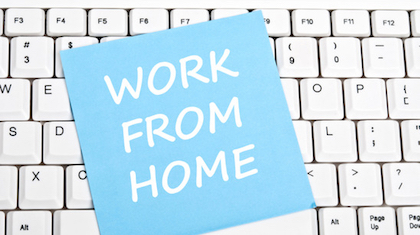Escape the commute and office politics by working from home.

Are you thinking of working from home? There are plenty of good reasons to do so. In a study by McCrindle Research, close to half of those who’d quit commuting and set up shop at home said that they enjoyed the flexibility it gave them. Another 25% said working from home provided them with a better work-life balance, while 15% said there were fewer distractions at home than in the office.[1]
So if you’re about to take the plunge yourself, there are a few things you’ll need to do.
Your space
Firstly, you’ll need to convert a room into an office. Make sure it’s got enough space to do the tasks that you need to do. Natural light is best, but if that’s not possible get a good desk lamp, and adequate heating and cooling.
Noise can also be an issue, so make sure you can shut out the sound of your family (if they’re home while you’re working) or noisy neighbours. Consider double-glazing on the windows if the outside noise is too much.
If you’re spending a lot of time in front of a screen, you’ll need to invest in a good desk and ergonomic chair. Consider getting a convertible desk that lets you stand up for some of the time to help minimise health problems from too much sitting.
Finally, if all your working hours take place in your home office, you won’t have access to technical support that you might have had in your workplace. So find yourself a good tech support person, and make sure that you regularly back up and update your computer. You may also want to set up a file-sharing system if you need to share work with colleagues at other sites.
Your routine
Once you’re set up, consider your routine. You may have a fair amount of freedom to structure your time – or you might need to work to strict deadlines to fit in with colleagues. Some people get dressed for work as it helps them mentally separate their work and home life. But whether you don a suit or work in your pyjamas, it’s best to make a routine and stick to it to ensure your work doesn’t seep into the rest of your life.
For some people, working from home can be a lonely experience. So make sure you have contact with others. Set up regular calls to colleagues; make the occasional coffee or lunch date or head to a gym class and exercise with others.
Your costs
Remember, if you’re working from home you may be able to claim some of your expenditure as tax deductions. How much depends on whether you’re a sole trader, a company or an employee. Some things you may be able to claim are:
-
Your computer and printer.
-
Landline, mobile phone and internet costs.
-
Any other electronic devices you use for work.
-
Office equipment.
-
Heating and cooling.
If you’re self-employed, you may also be able to claim some of your mortgage or rent payments, plus any other house-related expenses such as council rates or insurance premiums. Employees probably won’t be able to claim these costs.[1]
The rules about what you can and can’t claim on home offices can be complex – so talk to your accountant to find out what deductions you’re entitled to, and what records you need to keep.
[1] McCrindle Research (2013) Working from home; the benefits and the cost
